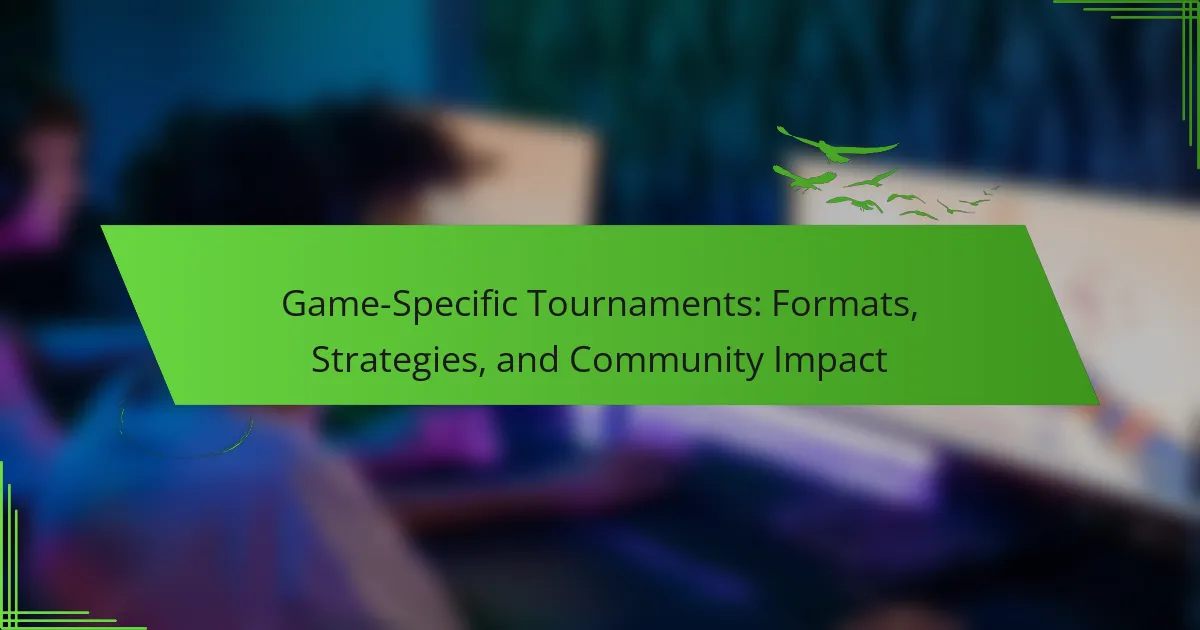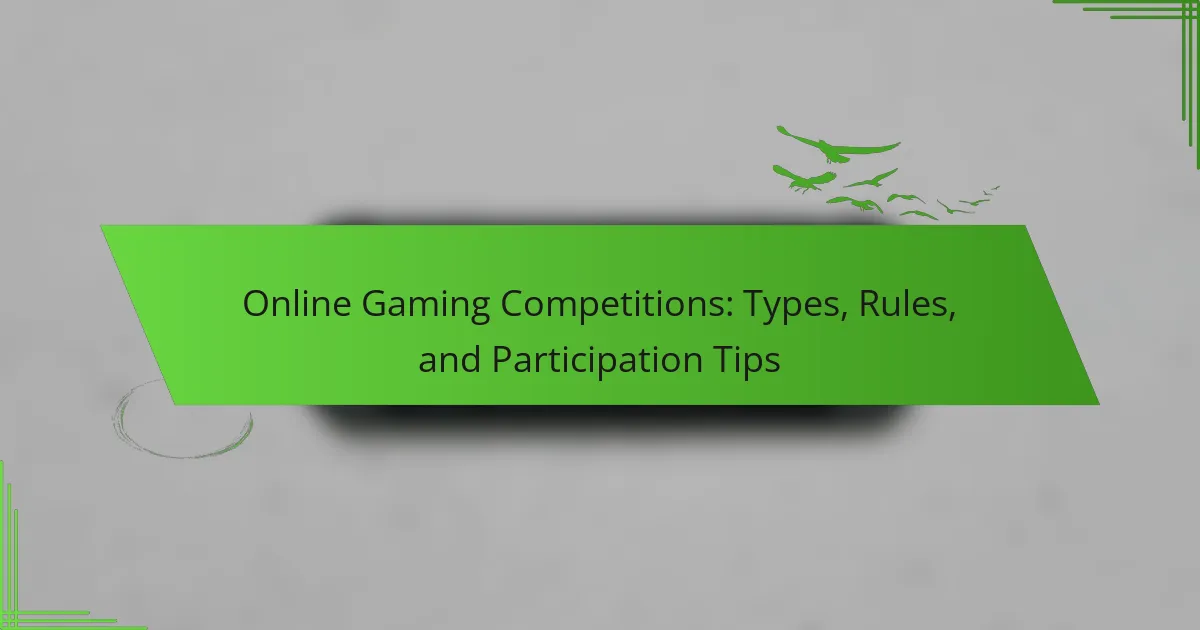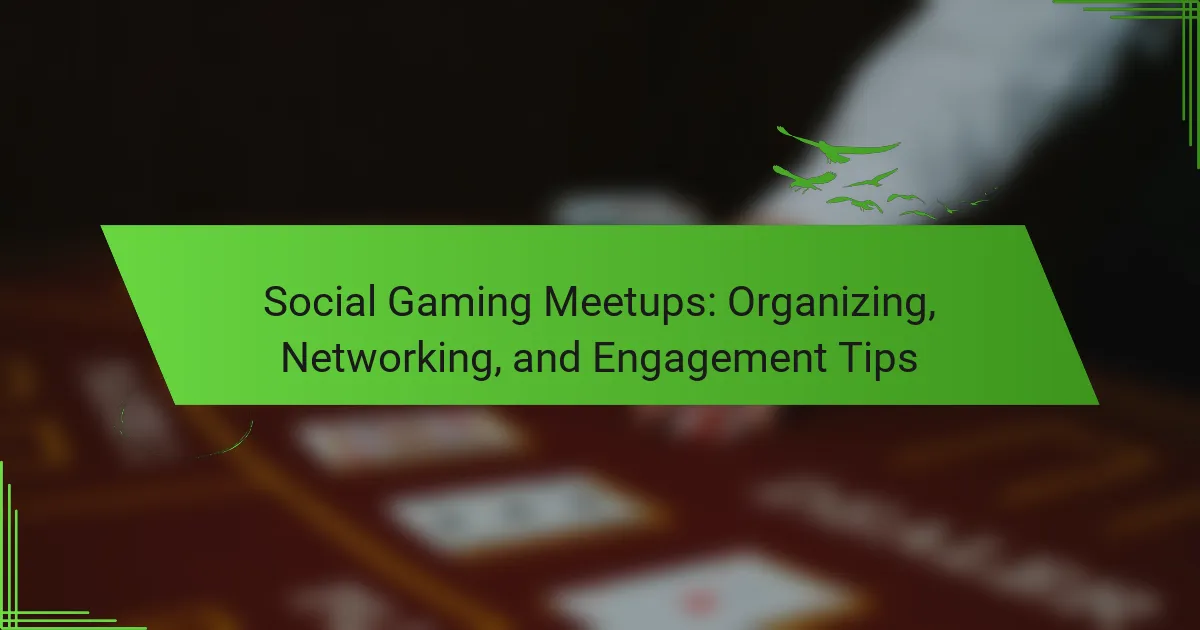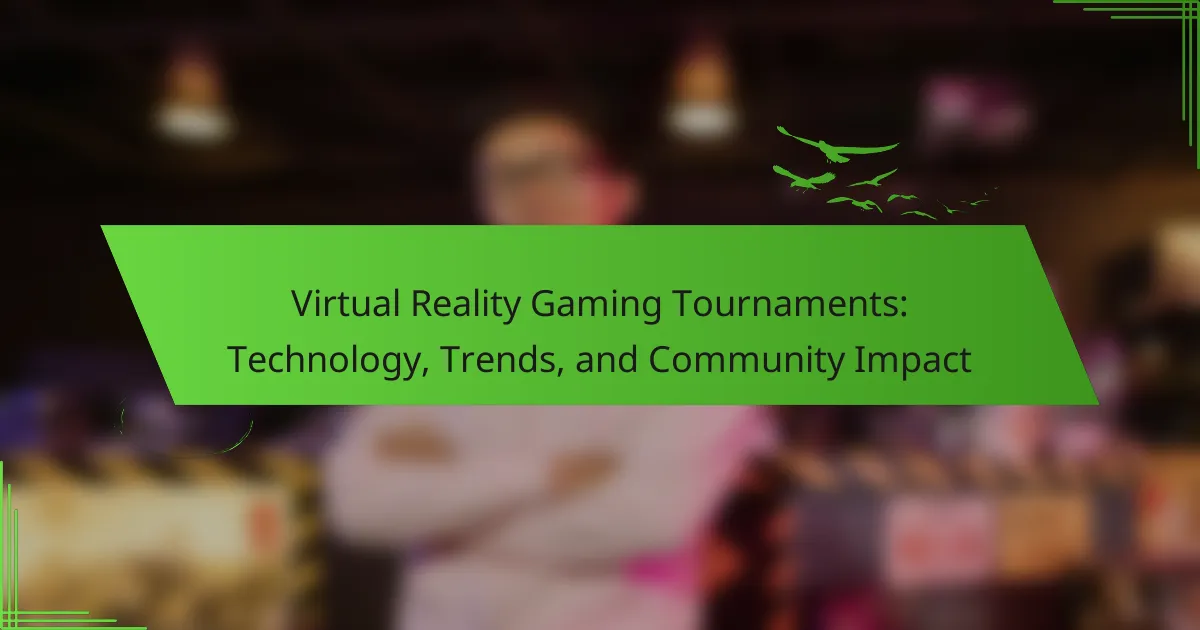Game-specific tournaments provide unique formats that shape player strategies and community involvement. Explore the various tournament formats, effective strategies for success, and their impact on local communities. Learn about leading organizations and future trends that influence the competitive gaming landscape.
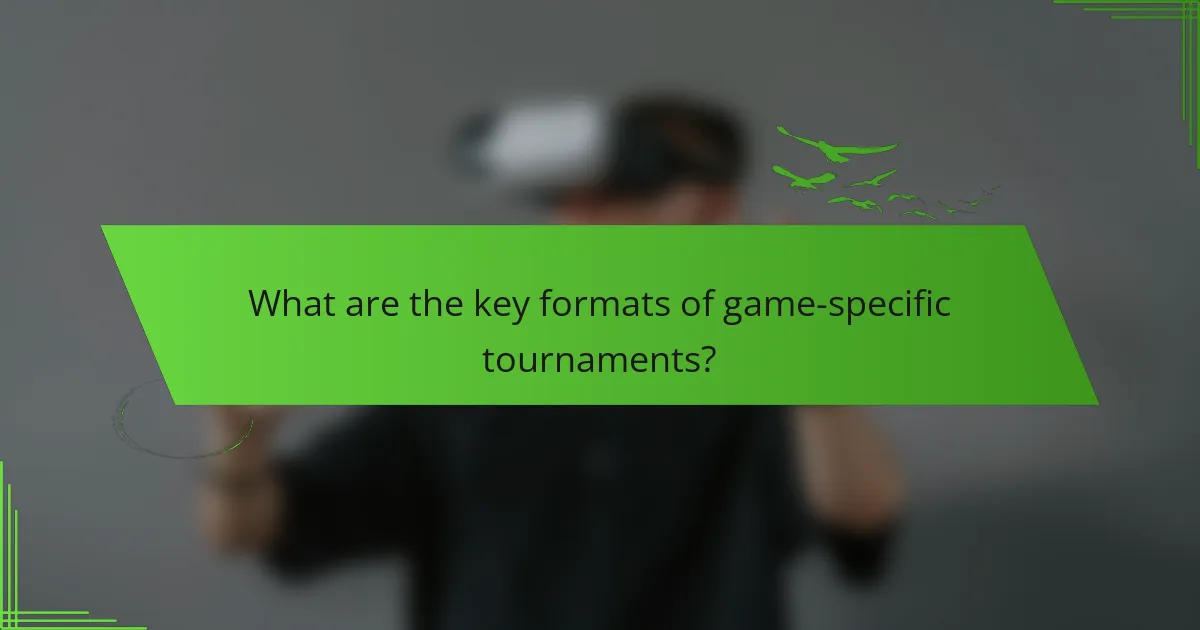
What are the key formats of game-specific tournaments?
Game-specific tournaments primarily feature formats such as single elimination, double elimination, round-robin, and Swiss system. Each format influences player strategies and community engagement differently.
Single elimination eliminates players after a single loss, promoting quick matches. Double elimination allows one loss before elimination, fostering resilience. Round-robin ensures every participant plays against all others, enhancing competition. Swiss system matches players with similar scores, balancing fairness and engagement.
How do single-elimination formats influence player strategies?
Single-elimination formats compel players to adopt aggressive and risk-taking strategies. Players must focus on immediate performance, as losing eliminates them from the tournament. This format encourages high-stakes decision-making, with a greater emphasis on offensive tactics. Players often prioritize quick wins, which can lead to unpredictable outcomes and heightened competition. Adapting strategies rapidly based on opponents’ styles becomes essential, influencing both gameplay and overall tournament dynamics.
What advantages do double-elimination formats offer over others?
Double-elimination formats offer several advantages, including increased participation, fairer competition, and more opportunities for teams to recover from losses. These formats allow teams to have a second chance, which can enhance engagement and excitement. Additionally, they often lead to more balanced matchups, as teams that perform well in the early rounds can face off against others with similar skill levels later in the tournament. This structure can create a more dynamic and unpredictable tournament experience, benefiting both players and spectators.
How do round-robin tournaments function and what are their benefits?
Round-robin tournaments function by having each participant compete against every other participant. This format ensures a comprehensive assessment of skills and performance among all competitors.
Benefits of round-robin tournaments include fairness, as each player faces the same opponents, and the ability to determine a clear ranking based on overall performance. Additionally, these tournaments foster community engagement by encouraging participation and interaction among players.
What are the emerging trends in tournament formats for 2025?
Emerging trends in tournament formats for 2025 include hybrid models, increased focus on inclusivity, and enhanced viewer engagement. Hybrid formats combine online and offline participation, catering to diverse player preferences. Inclusivity initiatives aim to broaden accessibility, allowing more players from various backgrounds to join. Enhanced viewer engagement strategies utilize interactive elements, such as real-time voting and augmented reality experiences, to enrich the spectator experience. These trends reflect a shift towards community-driven events that prioritize participation and engagement.
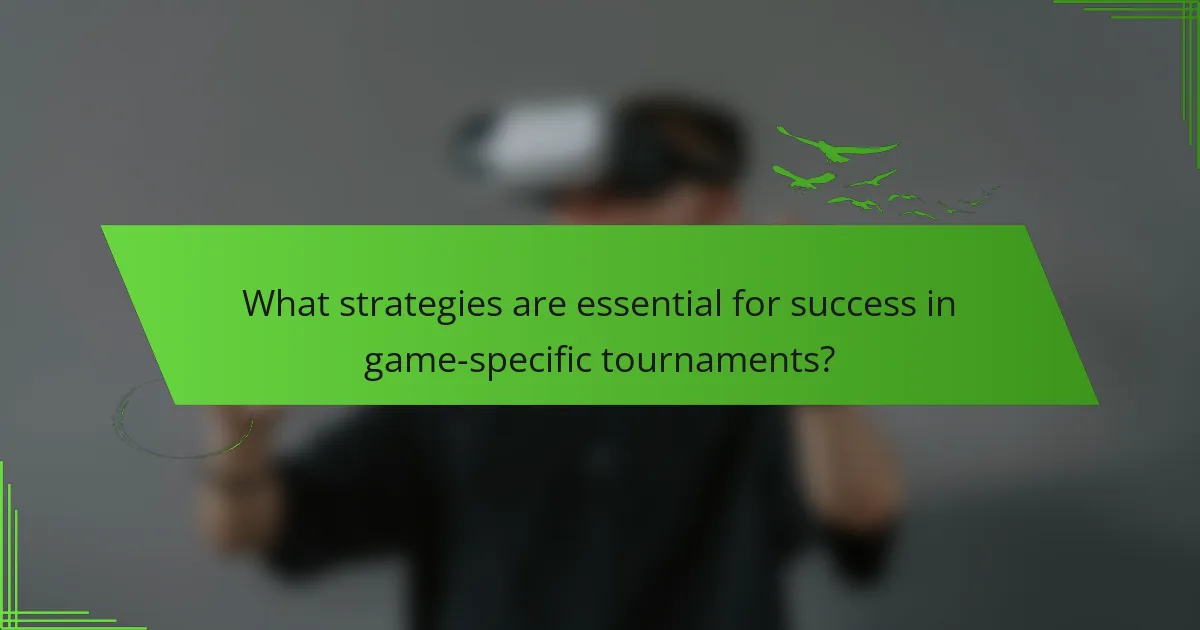
What strategies are essential for success in game-specific tournaments?
To succeed in game-specific tournaments, players must employ tailored strategies. Key strategies include mastering game mechanics, analyzing opponents, practicing teamwork, and adapting to evolving game dynamics. Focus on effective communication and maintaining a positive mindset during competition.
How can players adapt their strategies based on tournament format?
Players can adapt their strategies based on tournament format by analyzing the structure and rules of each format. Different formats, such as single-elimination, double-elimination, or round-robin, require distinct approaches. For example, in single-elimination tournaments, players must prioritize risk management and aggressive play to avoid early elimination. In contrast, round-robin formats allow for more experimentation since players have multiple chances to compete.
Understanding the unique attributes of each format is crucial. Single-elimination emphasizes quick decision-making and adaptability, while round-robin focuses on consistency and endurance. Players should also consider the community impact of each format, as it influences player engagement and strategy development. Adjusting strategies to align with tournament formats enhances competitiveness and overall performance.
What role does teamwork play in team-based tournaments?
Teamwork is crucial in team-based tournaments as it enhances coordination, strategy execution, and overall performance. Effective collaboration allows teams to leverage individual strengths, adapt to opponents, and make quick decisions. Strong teamwork fosters communication, which is vital for real-time adjustments during matches. Research indicates that teams with high cohesion often outperform those with less synergy, highlighting the importance of unity in competitive settings.
How can players leverage psychological tactics in competitive play?
Players can leverage psychological tactics in competitive play by employing strategies that enhance focus, disrupt opponents, and create advantageous mindsets. Techniques such as bluffing, reading body language, and maintaining composure under pressure can shift the dynamics of a match.
Understanding the opponent’s psychology allows players to anticipate moves, leading to better strategic decisions. For example, using feints can mislead opponents, creating openings for attack. Additionally, fostering a positive mindset can improve performance, as confidence often translates to better execution.
Incorporating these psychological tactics not only enhances individual gameplay but also influences the overall community dynamics, as players share and develop these strategies collectively. This creates a richer competitive environment that values mental acuity alongside physical skill.
What are the most common mistakes players make in tournaments?
Players often make strategic errors in tournaments that can impact their performance. Common mistakes include overcommitting to aggressive plays, misjudging opponents’ strategies, neglecting to adapt to changing game dynamics, and failing to manage resources effectively. These errors can stem from a lack of experience or pressure during high-stakes situations. Understanding these pitfalls can enhance player awareness and improve overall tournament outcomes.
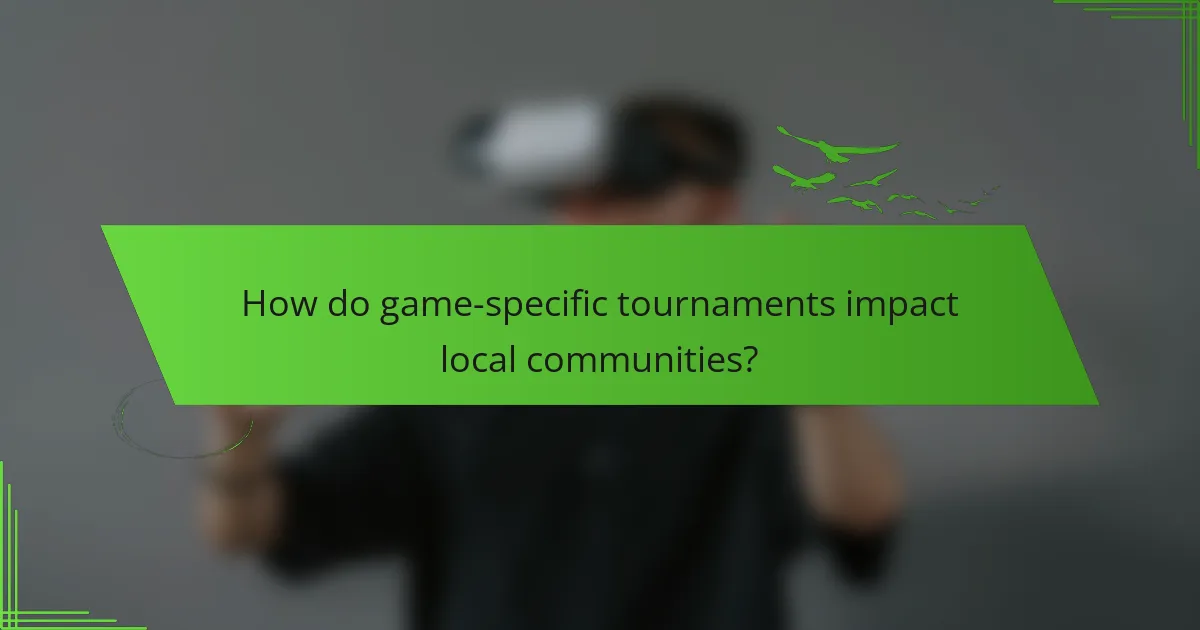
How do game-specific tournaments impact local communities?
Game-specific tournaments significantly enhance local communities by fostering social interaction, boosting local economies, and promoting inclusivity. These events create spaces for gamers to connect, share experiences, and build friendships.
Moreover, local businesses benefit from increased foot traffic and sales during tournaments, leading to economic growth. Tournaments can also encourage community engagement through volunteer opportunities and sponsorships, strengthening local ties.
Additionally, game-specific tournaments often promote inclusivity by welcoming diverse participants, which can lead to a more cohesive community. As a result, these events play a vital role in community development and cultural exchange.
What are the economic benefits of hosting gaming tournaments?
Hosting gaming tournaments generates significant economic benefits, including increased local spending and job creation. These events attract participants and spectators, boosting revenue for hotels, restaurants, and local businesses.
Additionally, tournaments can enhance a city’s visibility and reputation, leading to future events. For example, a major tournament can draw thousands of attendees, resulting in millions of dollars in economic impact.
Sponsorship and advertising opportunities also arise, providing financial support for organizers and contributing to the local economy. Overall, the economic benefits of hosting gaming tournaments extend beyond immediate financial gains, fostering community growth and development.
How do tournaments foster community engagement and networking?
Tournaments foster community engagement and networking by creating shared experiences among participants. These events encourage collaboration and interaction, leading to stronger connections. Players often form teams, share strategies, and build friendships, enhancing the sense of belonging. Additionally, tournaments provide platforms for local and global networking, allowing players to meet industry professionals and explore opportunities.
What role do local gaming shops play in tournament organization?
Local gaming shops play a crucial role in organizing tournaments by providing venues, resources, and community engagement. They facilitate a space where players can compete and socialize, enhancing the gaming experience. These shops often sponsor events, offer prizes, and promote participation through marketing. Their involvement fosters a sense of community, encouraging both casual and competitive players to connect. Additionally, local shops can tailor tournaments to specific games, ensuring formats and rules align with player preferences. This unique focus helps cultivate local gaming cultures and strengthens community ties.
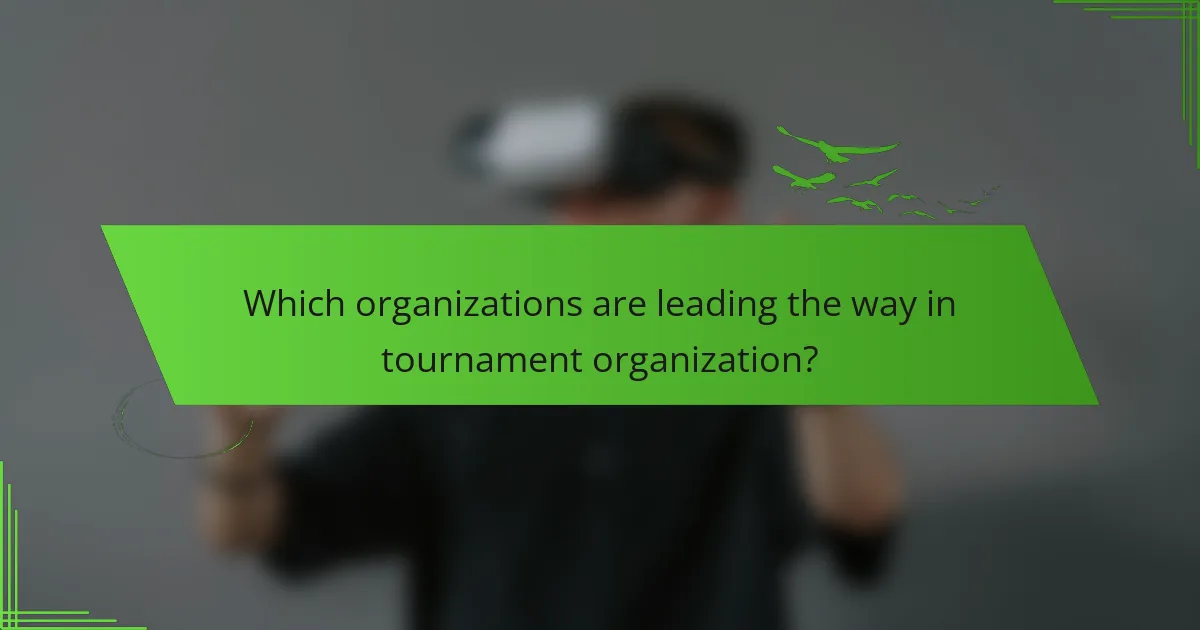
Which organizations are leading the way in tournament organization?
Leading organizations in tournament organization include ESL, DreamHack, MLG, FACEIT, and Riot Games. These entities excel in creating competitive environments, offering diverse formats and community engagement strategies. ESL is known for its extensive global reach, while DreamHack focuses on large-scale LAN events. MLG pioneered many esports formats, and FACEIT specializes in online competition. Riot Games effectively combines community feedback with tournament structures for titles like League of Legends.
What differentiates regional tournament organizers in North America and Europe?
Regional tournament organizers in North America and Europe differ primarily in their formats, strategies, and community engagement. North American organizers often emphasize larger prize pools and esports integration, while European organizers focus on grassroots involvement and diverse game formats.
In North America, tournaments frequently adopt a single-elimination format, promoting rapid competition. Conversely, European events often utilize double-elimination formats, allowing teams a second chance. This strategic difference influences player experience and community participation.
Community impact also varies significantly. North American organizers tend to prioritize commercial sponsorships and media exposure, enhancing visibility. In contrast, European organizers foster local communities through smaller, community-driven events, strengthening regional ties and player loyalty.
How have grassroots organizations changed the landscape of competitive gaming?
Grassroots organizations have significantly reshaped competitive gaming by fostering community engagement and creating diverse tournament formats. These organizations promote inclusivity, enabling players from various backgrounds to participate. They often implement innovative strategies that prioritize player experience and community involvement over traditional competitive structures.
Game-specific tournaments now feature unique formats tailored to different player skill levels, enhancing accessibility. For example, grassroots events often include amateur leagues alongside professional competitions, which helps nurture emerging talent. This dual approach cultivates a supportive environment, encouraging players to improve and compete.
Community impact is profound, as grassroots organizations often prioritize local engagement. They host events in accessible venues, creating a sense of belonging and camaraderie among participants. Additionally, they leverage social media and streaming platforms to reach wider audiences, amplifying the visibility of competitive gaming.
Overall, grassroots organizations have transformed competitive gaming into a more inclusive and community-driven landscape, emphasizing player development and local engagement.
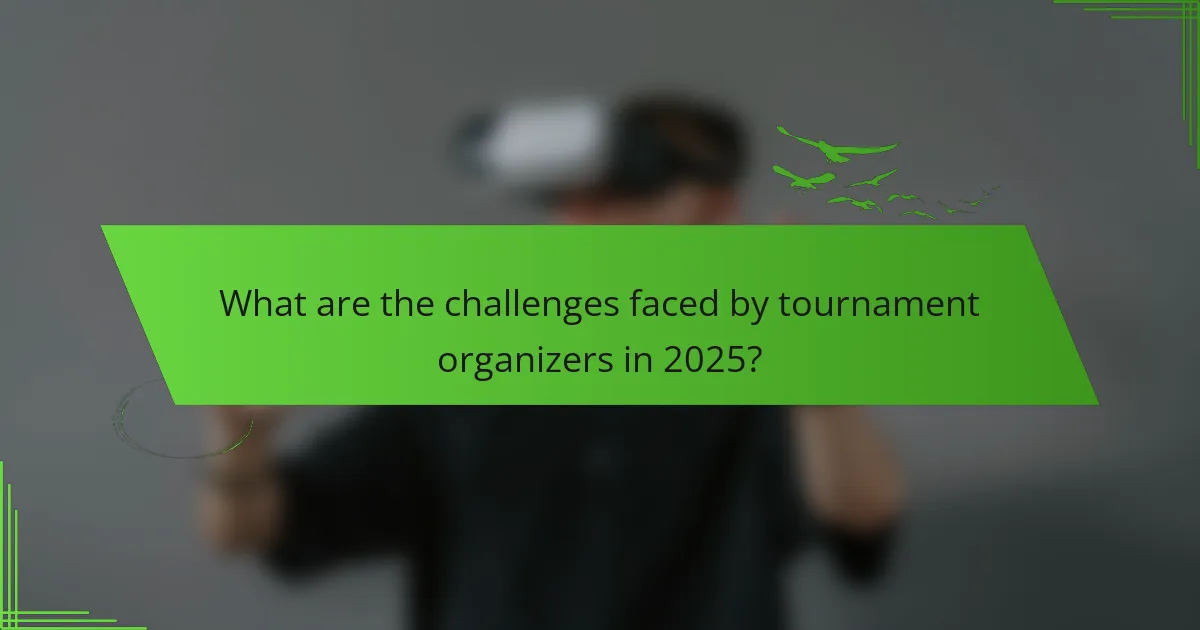
What are the challenges faced by tournament organizers in 2025?
Tournament organizers in 2025 face challenges including technological integration, community engagement, and financial sustainability.
Technological integration poses difficulties as organizers must adapt to rapidly evolving platforms and tools. Community engagement is essential yet challenging, as organizers strive to maintain interest and participation among diverse player demographics. Financial sustainability remains a concern, with fluctuating sponsorship and funding opportunities impacting event viability.
Moreover, unique attributes like the rise of virtual reality tournaments introduce rare logistical challenges in planning and execution. As a result, organizers must innovate continuously to overcome these obstacles and ensure successful events.
How do technological advancements affect tournament management?
Technological advancements significantly enhance tournament management by streamlining operations and improving participant experiences. Innovations like online registration systems, real-time scoring, and advanced analytics facilitate efficient organization and engagement. These tools allow for better communication with participants and spectators, increasing overall satisfaction and community involvement. Additionally, technologies such as virtual reality and augmented reality create immersive experiences, attracting larger audiences and fostering a vibrant gaming community.
What common logistical issues arise during tournaments?
Common logistical issues during tournaments include scheduling conflicts, equipment shortages, venue accessibility, and participant communication. These challenges can disrupt the flow of events and negatively impact player experience. Effective planning and coordination are essential to mitigate these issues. For instance, having backup equipment and clear communication channels can enhance readiness and adaptability.
How do organizers ensure fair play and sportsmanship?
Organizers ensure fair play and sportsmanship through strict rule enforcement, transparent scoring, and player education. They establish guidelines and consequences for unsportsmanlike behavior. Regular training sessions promote respect and integrity among participants. Monitoring by referees and officials during events enhances accountability.

What are the future trends in game-specific tournaments?
Future trends in game-specific tournaments include increased online participation, diverse formats, and enhanced community engagement. The rise of hybrid events combines in-person and digital elements, catering to broader audiences. Additionally, integration of advanced technology, such as virtual reality, enhances player experiences. Esports organizations focus on sustainability, promoting eco-friendly practices. Community-driven tournaments are gaining popularity, fostering inclusivity and grassroots support. These trends reflect the evolving landscape of competitive gaming.
How is the rise of online tournaments reshaping player participation?
The rise of online tournaments significantly enhances player participation by providing accessible platforms for competition. These tournaments allow players from diverse locations to engage, fostering community and collaboration.
Formats such as single-elimination, round-robin, and team-based competitions cater to different skill levels, encouraging broader involvement. Strategies like effective communication and team synergy are crucial for success in these environments, promoting a sense of belonging among participants.
Additionally, the accessibility of online tournaments reduces barriers to entry, enabling more players to join and compete. This inclusivity leads to increased player engagement and enthusiasm, ultimately reshaping the gaming community.
What innovations are being introduced to enhance spectator experience?
Game-specific tournaments are enhancing spectator experiences through innovative formats, interactive technologies, and community engagement. These tournaments often feature live-streamed matches with real-time statistics and player commentary, improving viewer engagement.
Additionally, the introduction of augmented reality (AR) and virtual reality (VR) technologies allows fans to experience games from unique perspectives. Community-driven events foster local engagement and support, creating a sense of belonging among spectators.
These innovations not only elevate the excitement of watching tournaments but also deepen the connection between players and fans, ultimately enriching the overall game experience.
How will virtual reality impact the format of future tournaments?
Virtual reality will significantly transform tournament formats by enhancing player immersion and audience engagement. It introduces interactive environments where participants can compete in realistic settings. This technology allows for innovative gameplay mechanics, such as virtual arenas and customizable avatars, which can redefine competition strategies. Moreover, VR can facilitate remote participation, expanding tournament accessibility to global audiences. As a result, the community can experience a more inclusive and dynamic competitive landscape, fostering greater interaction among players and fans alike.
What best practices should players follow to excel in tournaments?
Players should focus on preparation, adaptability, and teamwork to excel in tournaments. Understanding game mechanics and strategies is crucial.
1. Analyze past tournament performances to identify strengths and weaknesses.
2. Develop a flexible strategy that can adapt to opponents’ tactics.
3. Communicate effectively with teammates to enhance coordination.
4. Practice regularly to refine skills and improve reaction times.
5. Manage stress and maintain focus during matches.
6. Stay informed about game updates and community trends to leverage new strategies.
